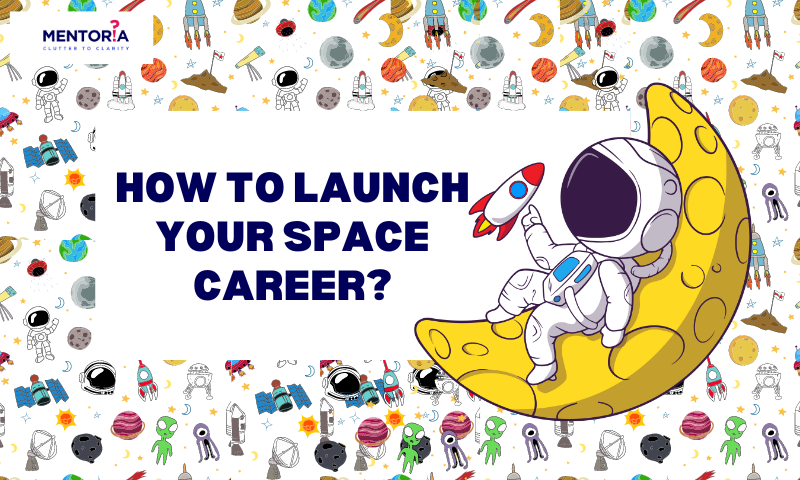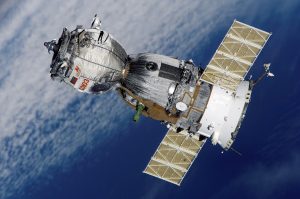How to Launch Your Space Career?

India is all set to celebrate its first-ever National Space Day on August 23, 2024. There is excitement in every nook and corner of the country. From the successfully completed Mars Orbiter Mission to the most desired plans for lunar exploration, India’s contributions to space science have been remarkable.
While highlighting these achievements, National Space Day provides an opportunity to inspire a new generation of space enthusiasts and experts. Prepare to celebrate and learn about the many possibilities available in India’s space sector!
As we all know, space is an exciting and rapidly developing industry that offers several job options for people with diverse backgrounds and skill levels. Even though it is considered an exclusive field, did you know that a career in space is actually very diverse? It incorporates nearly all types of career paths, from satellite design to climate monitoring to asteroid mining and so much more. Let’s dive deeper into this galaxy of information!
Careers in Space
STEM—Science, Technology, Engineering, and Mathematics, the acronym has become essential as our reliance on technology ha
s reached its peak. From weather prediction to GPS, telecommunication, and environmental monitoring, space technology leaves its impact on every sphere of our lives. So, with a career starting in STEM, you will not only place yourself at the threshold of an exciting and changing industry but also secure a career in the right direction for the future.
Essential Skills for a Space Career
- Strong Analytical Abilities: Be it in satellite design or data analysis from a space mission, one of the constant and most important characteristics has been the use of critical thinking and problem-solving. The ability to deconstruct complex problems and build simplified solutions will serve you really well in any space-related job.
- Advanced Technical Skills: It is essential to master the technical disciplines. To make it simpler, For engineers, it could mean expertise in programming, robotics, or mechanical design. For scientists, it could mean expertise in data analysis, simulation, and research methodologies.
- Adaptability and Creativity: The space industry is fast-moving and constantly changing (how ironic!). If you can adapt to new technologies, and think creatively to solve problems, it will surely help you succeed.
- Team Collaboration: Many space missions and operations are led by multidisciplinary teams that include people from several professions. For example, in a Mars exploration project, engineers, scientists, and computer experts work together to fulfil the mission’s goals, each providing their own set of talents.
- Attention to Detail: Since we are talking about exploration, space and technology both demand the aesthetics of precision. Every single part and process needs a detailed check as it can be the difference between a successful mission and failure.
Education Paths to Pursue a Profession in Space
1. Aerospace, Mechanical, and Electrical Engineering:
Aerospace, mechanical, and electrical engineering degrees provide very good contemporary bases for most careers in space. Postgraduate specialisation in spacecraft design or propulsion systems can lead you into multiple different careers in the industry. Let’s look at the specific undergraduate and postgraduate courses, as well as entrance tests, that can lead you to these intriguing space exploration options.
- Undergraduate Courses:
- Mechanical Engg. (B.Tech/B.E.)
- Aerospace Engg. (B.Tech/B.E.)
- Electrical Engg. (B.Tech/B.E.)
- Postgraduate Specialisations:
- M.Tech in Aerodynamics
- M.Tech in Spacecraft Design
- M.Tech in Propulsion Systems
- M.S. in Space Engineering
- Entrance Exams:
- Undergraduate: JEE Main, JEE Advanced, BITSAT, VITEEE
- Postgraduate: GATE, GRE (for programmes abroad)
2. Physics and Astronomy:
Work on gaining basic knowledge in the most fundamental subjects, physics and astronomy, where the general vision of phenomena in space and celestial mechanics can be grasped. Advanced degrees can lead you into research or, for instance, space observation and analysis.
- Undergraduate Courses:
- B.Sc. in Physics
- B.Sc. in Astronomy
- B.Sc. in Astrophysics
- Postgraduate Specialisations:
- M.Sc. in Physics
- M.Sc. in Astronomy and Astrophysics
- M.Sc. in Cosmology
- Entrance Exams:
- Undergraduate: JEE Main, IISER Aptitude Test, NEST
- Postgraduate: JAM, JEST, TIFR GS
-
Computer Science:
With the growing involvement of software in space technology, a degree in computer science can open up major benefits. You can have a specialisation in artificial intelligence, cybersecurity, or software development, with each offering unique opportunities.
- Undergraduate Courses:
- B.Tech/B.E. in Computer Science
- B.Sc. in Computer Science
- Postgraduate Specialisations:
- M.Tech in Artificial Intelligence
- M.Tech in Cybersecurity
- M.Tech in Software Development
- Entrance Exams:
- Undergraduate: JEE Main, BITSAT, VITEEE, COMEDK
- Postgraduate: GATE, GRE (for programmes abroad)
-
Mathematics:
Space comes with numbers, so a strong background in mathematics is necessary for positions that involve analysis of data, statistical modelling, and simulations. A degree in applied mathematics or statistics could lead you to a research job or even a job related to mission planning.
- Undergraduate Courses:
- B.Sc. in Mathematics
- B.Sc. in Applied Mathematics
- B.Sc. in Statistics
- Postgraduate Specialisations:
- M.Sc. in Mathematics
- M.Sc. in Applied Mathematics
- M.Sc. in Statistics
- M.Sc. in Computational Mathematics
- Entrance
- Undergraduate: IISER Aptitude Test, NEST
- Postgraduate: JAM, TIFR GS
If you are interested in climate monitoring or environmental applications of space technology, take up studies in environmental science. This field is dedicated to the utilisation of space data in order to curb ecological and climate change challenges, which if we pay close attention to Greta Thunberg and Leonardo Di Caprio, is the need of the hour.
- Undergraduate Courses:
- B.Sc. in Environmental Science
- B.Sc. in Environmental Studies
- Postgraduate Specialisations:
- M.Sc. in Environmental Science
- M.Sc. in Climate Science
- M.Sc. in Space-Based Earth Observation
- Entrance Exams:
- Undergraduate: CUET, NEST, ICAR AIEEA
- Postgraduate: JNU CEEB, GATE (Environmental Science)
Bonus Tips for Acing a Career in the Space Sector
- Research Companies
Research space companies that best align with your interests and values. Look for internships in organisations that are known to be innovative and excel in their field. Knowing the culture and mission of a company can help you find opportunities targeting better career choices.
2. Network Building
Networking is the key to any industry, and space is no exception. Industry events, conferences, seminars—all of these will help you get in touch with people. Joining organisations like the Indian Space Research Organisation or the Indian Institute of Space Science and Technology would further help in building your network with an extra increment in industry knowledge.
Start early with a career in space by getting yourself the right education and work experience. Such qualifications may further be supplemented by internships, research projects, or industrial certifications even to have firsthand experience in addition to surveys in your professional network. Stay current with emerging technology by attending conferences, seminars, and various online forums on issues surrounding the space industry.
Advancing Careers with Mentoria
Careers in the space sector allow you to be a part of ground-breaking developments and be pushed into the most exciting and promising cyclone. Mentoria‘s career counsellors can help you assess your interests, talents, and values, as well as develop a tailored career strategy. We can also introduce you to seasoned individuals in your sector who can offer advice, assistance, and networking opportunities.








